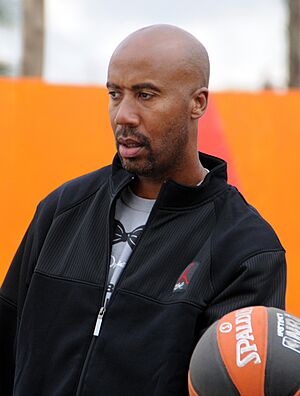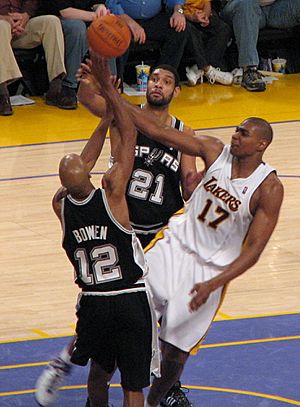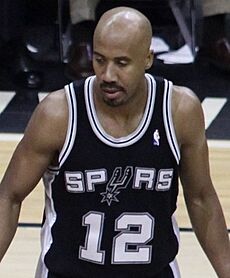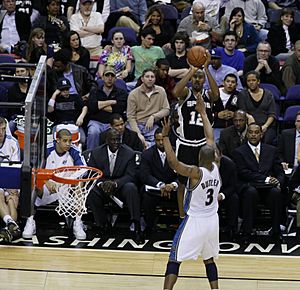Bruce Bowen facts for kids

Bowen in 2014
|
|
| Personal information | |
|---|---|
| Born | June 14, 1971 Merced, California, U.S. |
| High school | Edison (Fresno, California) |
| Listed height | 6 ft 7 in (2.01 m) |
| Listed weight | 200 lb (91 kg) |
| Career information | |
| College | Cal State Fullerton (1989–1993) |
| NBA Draft | 1993 / Undrafted |
| Pro career | 1993–2009 |
| Career history | |
| 1993–1994 | Le Havre |
| 1994–1995 | Évreux |
| 1995 | Fort Wayne Fury |
| 1995–1996 | Rockford Lightning |
| 1996–1997 | Besançon |
| 1997 | Rockford Lightning |
| 1997 | Miami Heat |
| 1997–1999 | Boston Celtics |
| 1999–2000 | Philadelphia 76ers |
| 2000–2001 | Miami Heat |
| 2001–2009 | San Antonio Spurs |
| Career highlights and awards | |
|
|
| Career NBA statistics | |
| Points | 5,290 (6.1 ppg) |
| Rebounds | 2,428 (2.8 rpg) |
| Assists | 1,089 (1.2 apg) |
Bruce Eric Bowen Jr. (born June 14, 1971) is an American former professional basketball player. He played as a small forward. Bruce Bowen graduated from Edison High School and Cal State Fullerton. He played for several teams in the National Basketball Association (NBA). These included the Miami Heat, Boston Celtics, Philadelphia 76ers, and San Antonio Spurs. He also played for the Continental Basketball Association's Rockford Lightning and in France.
Bowen was known as one of the best "lockdown" defenders in NBA history. He was chosen for the NBA All-Defensive Team eight times. He helped the Spurs win NBA championships in 2003, 2005, and 2007. Off the court, Bowen became a supporter for child obesity awareness.
Contents
Early Life and College Basketball
Bruce Bowen Jr. was born in Merced, California. He spent his younger years playing basketball. He became a star player at West Fresno Edison High School. After high school, he played four seasons at Cal State Fullerton. He played in 101 games during his college career. He averaged 11.4 points and 5.8 rebounds per game.
In his senior year (1992–93), he averaged 16.3 points, 6.5 rebounds, and 2.3 assists. He was named to the All-Big West Conference First Team. Bowen is 12th on his college team's all-time list for career points (1,155). He is also seventh all-time in rebounds (559).
Professional Basketball Career
Starting His Career
After college, Bruce Bowen was eligible for the 1993 NBA draft. However, no team chose him. From 1993 to 1997, Bowen played for five different teams. He started his professional career in France for Le Havre in 1993–94. He then played for Évreux in 1994–95.
In 1995–96, Bowen played in the CBA with the Rockford Lightning. He returned to France the next season with Besançon. In February 1997, he came back to the Lightning.
NBA Debut with Miami Heat
Bruce Bowen made his NBA debut in March 1997. He signed a short contract with the Miami Heat. He played in one game for one minute and had one block.
Playing for the Boston Celtics
For the 1997–98 NBA season, Bowen signed with the Boston Celtics. He slowly became a more important player in the NBA. In his first full NBA year, he played in 61 games. He averaged 5.6 points, 2.9 rebounds, and 1.43 steals per game. The next year was not as good for him. He played in only 30 Celtics games.
Time with Philadelphia and Return to Miami
In the 1999–2000 NBA season, Bowen signed with the Philadelphia 76ers. He was later traded to the Chicago Bulls but was quickly released. The Miami Heat then picked him up. That season, he played in 69 games.
The next year, Bowen had a great season with the Heat. He played in all 82 regular-season games for the first time. He averaged 7.6 points, 3.0 rebounds, and 1.6 assists per game. He became known as a strong defensive player. For his excellent defense, he was chosen for the All-Defensive Second Team.
San Antonio Spurs: Championship Years
In the 2001–02 NBA season, Bowen joined the San Antonio Spurs. This team was very strong, led by Hall-of-Fame center David Robinson and power forward Tim Duncan. Bowen became a starter, playing in all 59 regular-season games he appeared in. He earned his second All-Defensive Second Team award.
In the next season, Bowen started all 82 regular-season games. He was again voted into the All-Defensive Second Team. He was a key part of the Spurs team that won the 2003 NBA Finals. At 31 years old, Bowen won his first championship ring as a starter. He was known for his accurate three-point shooting, especially from the corners. Over the next three seasons, Bowen became known as one of the best perimeter defenders in the NBA. He was chosen for the All-Defensive First Team three times in a row.
Chasing More Titles
Bowen's tough style of play was often discussed. Other players sometimes said he played too close to them. However, many believed he just played strong defense without trying to hurt anyone. Despite his defense, the Spurs did not win back-to-back titles in the 2004 NBA playoffs. They lost to the Los Angeles Lakers.
Bowen and the Spurs came back strong and won the NBA title in 2005. They beat the Detroit Pistons. However, they could not win two titles in a row in 2006. In the 2007 NBA playoffs, Bowen was involved in some controversial moments. Despite this, his defense helped the Spurs win their fourth championship in the 2007 NBA Finals.
Final Seasons with the Spurs
In the 2007–08 NBA season, Bowen, at 36, played and started in 81 games. He earned his fifth straight spot on the NBA All-Defensive First Team. He was a runner-up for the league's Defensive Player of the Year award. In the 2008 NBA playoffs, the Spurs lost to the Los Angeles Lakers. Bowen had started every regular season and playoff game for the Spurs from 2001 to 2008.
The 2008–09 NBA season was Bowen's last with the Spurs. He played in 80 games but was no longer a starter. His playing time was also reduced. The Spurs lost in the first round of the 2009 NBA playoffs.
On June 23, 2009, Bowen was traded to the Milwaukee Bucks. He was released on July 31, 2009, and retired from basketball on September 3, 2009. On March 21, 2012, the Spurs honored Bowen by retiring his #12 jersey. This means no other Spurs player will wear that number. However, Bowen later allowed the Spurs to reissue the number 12 for player LaMarcus Aldridge in 2015.
National Team Experience
In 2006, U.S. coach Mike Krzyzewski invited Bowen to join the U.S. national team. The team played in the 2006 FIBA World Championships in Japan. At 35, Bowen was the oldest player on the team. Coach Krzyzewski said the team needed a strong defensive player like Bowen. However, Bowen did not play much. He was eventually cut from the team.
Player Skills and Style

Bruce Bowen was 6 feet 7 inches tall and weighed 200 pounds. He played small forward and sometimes shooting guard. He was known as one of the best perimeter defenders in the NBA. He was chosen for the NBA All-Defensive First or Second Teams eight times from 2001 to 2008. From 2005 to 2007, he was second in voting for the NBA Defensive Player of the Year Award.
Bowen was not known for scoring a lot of points. He averaged 6.1 points, 2.8 rebounds, and 1.2 assists per game in his career. His free throw shooting was not very strong. However, he was a very accurate three-point shooter, especially from the corners. His career average for three-point shots was .393. Bowen also played in 500 games in a row between 2002 and 2008. This led Sports Illustrated to call him the "Iron Man" of the NBA in 2007.
Life After Basketball
Bruce Bowen often speaks out about child obesity. In 2004, he started a program called "GET FIT with Bruce and Buddy." This program teaches children about healthy eating and daily sports activities. He also runs the Bruce Bowen Foundation. This organization helps provide scholarships for students. In 2006, he earned a college degree in communications from Cal State Fullerton. He has said he wants to become a teacher. In 2011, Bowen was honored by being inducted into the Fresno County Athletic Hall of Fame.
After retiring from playing, Bowen worked as an NBA analyst for ESPN. He also worked as a TV commentator for the Los Angeles Clippers' games. In April 2019, Bowen became the boys' basketball coach at Cornerstone Christian School in San Antonio.
Personal Life
Bruce Bowen considers Robert and Sandra Thrash as his adoptive parents. He met them through church during his college years in Los Angeles.
See also
 In Spanish: Bruce Bowen para niños
In Spanish: Bruce Bowen para niños
 | Lonnie Johnson |
 | Granville Woods |
 | Lewis Howard Latimer |
 | James West |



